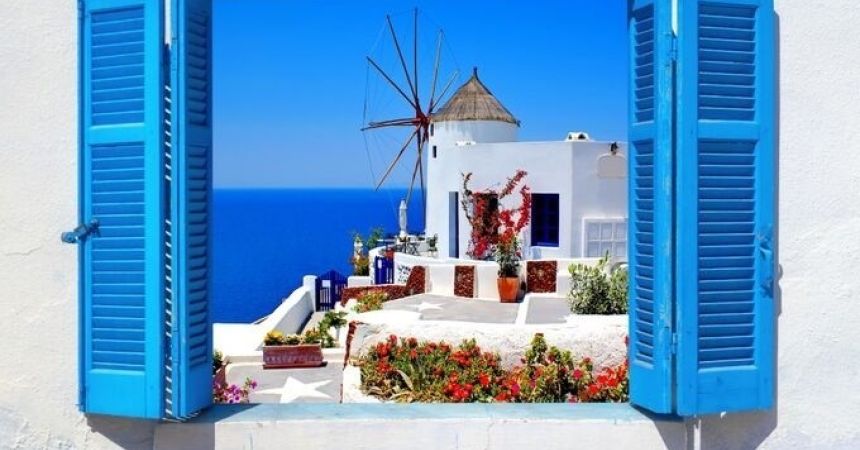
Turkey and Greece Travel Planning | Best Itinerary Ideas
Traveling to Turkey and Greece, two of the most culturally and historically rich destinations in Europe, is a dream for many. Combining these two countries into one trip offers an extraordinary experience, blending stunning landscapes, ancient history, and vibrant cultures. This guide will walk you through everything you need to know to plan a perfect trip to both Turkey and Greece.
Introduction How to Create Your Greece-Turkey Itinerary
Planning a trip to Turkey and Greece requires careful consideration of various factors including visa requirements, itinerary, budget, and cultural insights. This guide will provide a detailed roadmap to help you organize your journey, ensuring you make the most of your time in these beautiful countries.
Research and Planning
1.1 Determine Your Travel Dates
Consider the Best Time to Visit:
- Turkey: Spring (April to June) and fall (September to November) offer pleasant weather and fewer tourists. Summer (July and August) can be hot, especially in inland areas.
- Greece: Similar to Turkey, spring and fall are ideal, with mild temperatures and fewer crowds. Summer is high season with warm weather and busy tourist spots.
Check Public Holidays and Festivals:
- Turkey: Major holidays like Ramadan and Eid can affect travel plans and availability.
- Greece: Festivals like Easter and the Athens and Epidaurus Festival are significant cultural events.
1.2 Set a Budget
Estimate Costs:
- Flights: Compare prices for international and regional flights between Turkey and Greece.
- Accommodation: Research options ranging from luxury hotels to budget hostels.
- Meals: Consider dining out at various types of restaurants.
- Transportation: Budget for local transportation, including buses, trains, taxis, and car rentals.
- Attractions and Activities: Include costs for entry fees to historical sites, tours, and excursions.
Plan for Extra Expenses:
- Souvenirs and Miscellaneous Costs: Allocate funds for shopping and unexpected expenses.
1.3 Research Destinations
Turkey:
- Istanbul: The bustling city known for its rich history and vibrant culture.
- Cappadocia: Famous for its unique rock formations and hot air balloon rides.
- Ephesus: Ancient ruins that showcase Turkey’s rich historical heritage.
- Antalya: A beautiful coastal city with a mix of history and beach resorts.
Greece:
- Athens: Home to ancient ruins like the Acropolis and Parthenon.
- Santorini: Renowned for its stunning sunsets and unique architecture.
- Mykonos: Famous for its lively nightlife and beautiful beaches.
- Crete: Offers a mix of historical sites, natural beauty, and traditional villages.
1.4 Create an Itinerary
Decide on Duration:
- Turkey: Allocate at least 5-7 days to explore major cities and landmarks.
- Greece: Allocate 5-7 days to visit key islands and historical sites.
Plan Your Route in Turkey and Greece:
- Turkey to Greece Travel Options:
- Flights: Direct flights between major cities (e.g., Istanbul to Athens).
- Ferries: Possible routes between Turkey and Greek islands.
- Intra-Country Travel:
- Turkey: Consider internal flights, buses, and trains.
- Greece: Use ferries for island hopping and flights for longer distances.
Visa and Travel Documentation
2.1 Visa Requirements
Turkey:
- E-Visa: Available for many nationalities. Apply online for a quick and convenient process.
- Consular Visa: Required for some nationalities. Apply through a Turkish embassy or consulate.
Greece:
- Schengen Visa: Required for most non-EU travelers. Apply through a Greek consulate or embassy.
- Visa Exemptions: Some countries are exempt from visa requirements for short stays.
Travel Insurance:
- Ensure you have comprehensive travel insurance covering health, cancellations, and theft.
2.2 Important Documents
- Passports: Must be valid for at least six months beyond your intended stay.
- Visas: Ensure you have the correct visa for each country.
- Travel Itinerary: Printouts or digital copies of your travel plans, including flights and accommodation.
2.3 Health and Safety
- Vaccinations: Check if any vaccinations are required or recommended.
- Health Insurance: Ensure coverage for medical emergencies.
- Local Emergency Numbers: Familiarize yourself with local emergency contacts.
Accommodation and Transportation in Greece and Turkey
3.1 Accommodation Options
Turkey:
- Istanbul: Hotels, hostels, and boutique accommodations in Sultanahmet and Taksim areas.
- Cappadocia: Cave hotels offering unique stays.
- Antalya: Resorts and beachside hotels.
Greece:
- Athens: Hotels and hostels near the Acropolis and Plaka.
- Santorini: Luxury hotels with caldera views.
- Mykonos: Beachfront resorts and boutique hotels.
Booking Tips:
- Early Reservations: Book accommodations in advance, especially during peak seasons.
- Check Reviews: Read guest reviews to ensure quality.
3.2 Transportation
Turkey:
- Domestic Flights: Useful for traveling between major cities.
- Trains and Buses: Convenient for shorter distances and scenic routes.
- Local Transport: Use taxis, trams, and buses within cities.
Greece:
- Ferries: Essential for island hopping Greece.
- Domestic Flights: Useful for traveling between mainland and islands.
- Public Transport: Use buses and metro in cities like Athens.
Car Rentals:
- Turkey: Renting a car can be beneficial for exploring rural areas.
- Greece: Car rentals are useful for exploring islands and coastal regions.
Cultural Insights and Etiquette
4.1 Turkey
Language: Turkish is the official language. English is widely spoken in tourist areas.
Cultural Etiquette:
- Dress Modestly: Especially when visiting religious sites.
- Respect Traditions: Be mindful of local customs and traditions.
- Tipping: Common in restaurants and for services.
Local Customs:
- Hospitality: Turkish people are known for their warm hospitality.
- Greetings: A handshake is common; greetings are often accompanied by a smile.
4.2 Greece
Language: Greek is the official language. English is commonly spoken in tourist areas.
Cultural Etiquette:
- Dress Appropriately: Especially when visiting churches and monasteries.
- Respect Local Traditions: Be aware of and respect local customs.
- Tipping: Not obligatory but appreciated in restaurants and for services.
Local Customs:
- Hospitality: Greeks are known for their friendly and welcoming nature.
- Greetings: A handshake or kiss on both cheeks is common.

Activities and Attractions in Turkey and Greece
5.1 Turkey
Istanbul:
- Hagia Sophia: A historical architectural marvel.
- Topkapi Palace: Former residence of Ottoman sultans.
- Grand Bazaar: A vibrant market with thousands of shops.
Cappadocia:
- Hot Air Balloon Rides: Experience breathtaking views of the unique landscape.
- Goreme Open Air Museum: A collection of rock-cut churches and monasteries.
Ephesus:
- Library of Celsus: An impressive ancient library.
- Great Theatre: A well-preserved Roman theatre.
Antalya:
- Old Town (Kaleici): Explore the charming, historic district.
- Duden Waterfalls: Beautiful waterfalls near the city.
5.2 Greece
Athens:
- Acropolis: Ancient citadel with iconic structures like the Parthenon.
- Plaka District: Historic neighborhood with traditional architecture and shops.
Santorini:
- Oia Village: Famous for stunning sunsets and picturesque views.
- Fira: The island's bustling capital with shops and restaurants.
Mykonos:
- Mykonos Town: Known for its lively nightlife and charming streets.
- Beaches: Relax on popular beaches like Paradise and Super Paradise.
Crete:
- Knossos Palace: Ancient Minoan palace with rich archaeological significance.
- Samaria Gorge: A scenic hiking destination.
5.3 Tips for Activities in Greece and Turkey
- Book Tours in Advance: Popular Turkey and Greece tours and activities can fill up quickly.
- Check Opening Hours: Ensure attractions are open during your visit.
- Stay Hydrated: Especially during hot weather and while exploring.
Food and Dining in Turkey and Greece
6.1 Turkey
Cuisine Highlights:
- Kebabs: Varieties include shish kebab, döner, and adana kebab.
- Mezes: Small dishes such as hummus, baba ghanoush, and dolmas.
- Baklava: Sweet pastry made with layers of filo dough and nuts.
Dining Tips:
- Try Local Specialties: Sample traditional dishes and regional specialties.
- Avoid Tourist Traps: Seek out local restaurants for an authentic experience.
6.2 Greece
Cuisine Highlights:
- Moussaka: Baked dish made with layers of eggplant, minced meat, and béchamel sauce.
- Souvlaki: Skewered and grilled meat, often served with pita and tzatziki.
- Baklava: Similar to Turkish baklava, with a sweet and nutty flavor.
Dining Tips:
- Explore Taverns: Traditional Greek taverns offer a genuine dining experience.
- Enjoy Fresh Seafood: Particularly in coastal regions and islands.
Shopping and Souvenirs in Turkey and Greece
7.1 Turkey
Popular Souvenirs:
- Turkish Carpets: Handwoven rugs and carpets.
- Ceramics: Hand-painted pottery and tiles.
- Spices: A variety of spices from the Grand Bazaar.
Shopping Tips:
- Bargain: Negotiating prices is common in markets and bazaars.
- Avoid Counterfeits: Ensure you buy authentic items from reputable sellers.
7.2 Greece
Popular Souvenirs:
- Olive Oil: High-quality Greek olive oil.
- Jewelry: Traditional Greek designs and handcrafted pieces.
- Ceramics: Hand-painted Greek pottery.
Shopping Tips:
- Look for Local Crafts: Seek out authentic Greek crafts and products.
- Support Local Artisans: Purchase directly from local artisans for unique items.
Safety and Health
8.1 Safety Tips
Turkey:
- General Safety: Turkey is generally safe for tourists. Follow standard safety precautions.
- Avoid Crowded Areas: Be cautious in busy markets and public places.
Greece:
- General Safety: Greece is also considered safe for tourists. Exercise common sense and awareness.
- Be Cautious in Tourist Areas: Watch for pickpockets in crowded spots.
8.2 Health Considerations
Turkey:
- Food and Water: Drink bottled water and eat food from reputable sources.
- Sun Protection: Use sunscreen and stay hydrated.
Greece:
- Food and Water: Tap water is generally safe to drink, but bottled water is available.
- Sun Protection: The sun can be strong; wear sunscreen and protective clothing.
Final Preparations
9.1 Packing List
Essentials:
- Travel Documents: Passports, visas, travel insurance.
- Clothing: Weather-appropriate clothing, including swimwear and comfortable walking shoes.
- Electronics: Chargers, adapters for electrical outlets.
Additional Items:
- Travel Guidebooks: Useful for on-the-go information.
- Health Supplies: Personal medications, first aid kit.
9.2 Communication
Turkey:
- SIM Cards: Available at airports and shops for local data and calls.
- Wi-Fi: Widely available in hotels and public spaces.
Greece:
- SIM Cards: Purchase at airports or local shops.
- Wi-Fi: Common in accommodations and many public areas.
9.3 Final Checks
- Confirm Bookings: Double-check flight, accommodation, and transportation bookings.
- Review Itinerary: Ensure you have all necessary details and tickets.
Planning a Greece-Turkey Trip: Start Here
Planning a Travel to Turkey and Greece involves careful preparation to ensure a smooth and enjoyable experience. By researching your destinations, understanding visa requirements, and preparing your itinerary, you can make the most of your journey through these captivating countries. With the right planning and a sense of adventure, your trip to Turkey and Greece will be an unforgettable exploration of history, culture, and natural beauty.



